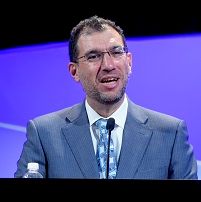Article
Learning to Love MACRA: CMS Czar Slavitt Addresses the AMA
Author(s):
The Obama administration's Medicare Czar Andy Slavitt addressed the American Medical Association, trying to ease concerns about a new payment scheme known as MACRA.

For all their heartfelt talk about the joys, sense of fulfillment and intellectual challenges that come with practicing medicine, physicians tend to find payment issues a riveting topic.
Looming changes in how physicians will be paid for caring for patients through Medicare and Medicaid starting in January 2017 are a major concern.
Little wonder then that a speech June 13 by Andy Slavitt, Acting Director of the Centers for Medicare and Medicaid Services (CMS), at the American Medical Association’s annual House of Delegates meeting in Chicago, IL was a hot ticket.
There were 530 delegates, 96% of the membership, on hand to hear what Slavitt (Photo above courtesy of the AMA) would say.
Slavitt, outlining the changes to come under the Medicare Access and CHIP Reauthorization Act (MACRA) promised the delegates that he is open to hearing their ideas for revisions in the 900-page plan—not just when a public comments period ends June 27 but even after MACRA is rolled out.
In a question and answer session he even said he might be open to extending the compliance deadline for small practices, and to not hold certain specialists to quality performance measures until such time as their own specialty societies had developed them.
He pledged to consider the unique problems of physicians in rural or underserved areas running small and solo practices, where MACRA’s emphasis on technological and patient care improvement metrics, team collaboration in the form of medical home and can be more of a financial burden.
Physicians have complained to him that they want to spend more time on patient care and less time on documentation and Slavitt promised MACRA will make that possible.
Slavitt also vowed to bring technology and software makers to task. Making software for electronic health records interoperable from one venue, such as a physician’s office, to another, such as a hospital, is a something that must happen, he said. As it stands, due to competing and mismatched software, many healthcare entities cannot talk to each other.
“The burden [of interoperability] should be on technology, not the user,” Slavitt said, “Today’s silos have been created by business practices we cannot tolerate any longer. “
The delegates seemed warily receptive to Slavitt’s remarks, applauding at several junctures.
That led Slavitt to ad lib at one point that he was happy to pause at any time the audience wished to clap.
“You can tell I’m not used to it, not in this job,” Slavitt said.
An Obama appointee, Slavitt took the job in 2014 in the wake of the disastrous rollout of the Affordable Care Act’s signup software. He was previously executive vice president of Optum, a subsidiary of United Health Group and also has a Wall Street background. He holds business degrees from the Wharton School and Harvard.
He presided over the repeal of the Sustainable Growth Rate, a cumbersome much-hated system under which Congress would annually decide what changes in Medicare payments were reasonable and necessary to keep pace with rising healthcare costs.
The big challenge now, Slavitt said, is to ensure that Medicare survives in a demographic shift where the growth of the numbers of people who are eligible for Medicare is exceeding that of the growth of the numbers of working adults to fund it. He urged the delegates not to retreat into cynicism but to work with him to make the new system fair and effective in returning the patient, not compliance with regulations, to center stage.
To sell the MACRA program, Slavitt has spoken with thousands of physicians from small practices to large medical societies.
Commenting on the speech in an interview later, the AMA's president-elect Andrew Gurman, MD, said Slavitt's appearance before the group was "A terrific first step, and I liked that he recognized the rocky history we've had with CMS."


